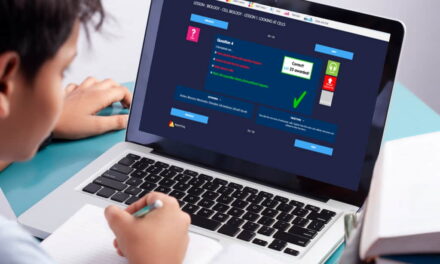Local authorities play an important role in supplying effective education for children, but the right support must be supplied, at the right place, and at the right time. What about those who cannot access a mainstream setting?
Embedding a supportive education system that addresses the needs of students is imperative to ensure their enthusiasm is continued in a setting where they feel most comfortable. SEND students can require additional support to help with their needs. The Department for Education wants to establish a new national SEND and alternative provision system that:
– fulfils children’s potential
– builds parents’ trust
– Provides financial sustainability.
Local authorities have a responsibility for arranging a suitable full-time education for those who may be excluded, those who cannot attend for their specific reason or those who are absent. An online alternative provision can help a student feel more comfortable, in some instances, if appropriate measures are integrated.
Student absence impacts
Schools must inform local authorities when a child is absent and work in conjunction with each other regarding funding and integrating a suitable provision for the child.
“Across the year to date, 22.0% of pupil enrolments missed 10% or more of their possible sessions and are therefore identified as persistently absent.”
Covid, illness and other factors have resulted in a detrimental impact on children’s education. However, a suitable online alternative provision could support these students with their education. Having a provision that allows students to study the current curriculum with continuous assessment can allow them to flourish. Ultimately, this can help students, especially those with SEND, to continue their education when they cannot attend a mainstream setting.
According to statistics:
“82% of children and young people in state-place funded alternative provision have identified special educational needs (SEN), and it is increasingly being used to supplement local SEND systems.”
When supporting students with SEND, their needs must be addressed. This can vary from student to student, but schools and local authorities need to work together to find the most suitable option.
“Ultimately schools are responsible for the safeguarding and welfare of pupils educated off-site. Therefore, by using code B, schools are certifying that the education is supervised, and measures have been taken to safeguard the pupil.”
Student absence has seen a sharp increase recently and there are now several students who are going missing from education. These students must be safeguarded and put on a platform where they can fulfil their potential.
Additionally, it’s important for schools and local authorities that attendance is upheld. An online alternative provision could be one way this is sustained. Certain provisions can allow for attendance codes to be claimed to maintain a student and school’s attendance record.
Are students being home-educated effectively?
Students who are being home-educated need to have parameters implemented that will allow their learning to be productive. However:
“Local authorities have no legal duties to monitor the quality of home education on a regular basis and no powers to insist on seeing a child in order to establish whether they are receiving a suitable education.”
Local authorities need to improve on this situation, or, they could provide an online alternative provision that caters to these requirements ensuring the safety and safeguarding of a child.
Students’ mental health and engagement cannot be monitored in these scenarios, but what if they could?
Online alternative provisions have the potential to provide innovative safeguarding and tracking measures within a system. Constantly checking on the welfare of students, or tracking everything they do, is a considerate avenue to ensure the best interests of a student.
EDClass spoke to Councillor Maroof Raouf, Deputy Chair of the Education, Children and Families Policy Committee at Sheffield City Council and he stated:
A blended learning approach is something we are aware of and we are looking at the growing options available to schools. It’s just ensuring that students are being put in an environment that is conducive to learning. Parents and pupils must also be willing to engage. There’s got to be that willingness. There is much more to be done and we are looking more at what we can do in the coming academic year. We are looking at additional strategies and what other local authorities are doing and how they’ve improved their attendance figures.
Funding challenges
Funding costs are a significant factor in supplying effective education for local authorities. The needs of the child need to be addressed and timely and effective support should be administered. Students need the right support, in the right place, at the right time so EHCPs are reduced. According to statistics on funding:
“£400 million of the £2 billion additional funding for schools, announced in the Autumn Statement, will be allocated to local authorities’ high needs budgets in 2023-24. In 2023-24, high needs funding will be rising to £10.1 billion – an increase of over 50% from the 2019-20 allocations.”
This proposed increase in funding is a step in the right direction, but there needs to be more focus on what the child exactly needs to ensure their education is continued. EDClass also spoke to Councillor Raouf stated:
I think it’s very important to make sure that the funding that we do get is spent wisely. I also think if we’re working on it on a pupil-per-pupil basis that would be much easier. By identifying the most vulnerable cohorts, what we can do is make sure that each pupil, whether that’s primary or secondary, can have the right support in place to enable them to reengage in education.
Family engagement is paramount for a child to succeed. Local authorities ensure families know what services are being offered to their children and what support can be accessed. Moreover, the cost of living and child care costs affect millions in the UK, subsequently impacting mental health and wellbeing.
Certain online alternative provisions can supply high-quality teaching on demand with the right support. The value-for-money aspect of some online alternative provisions can also not be unnoticed. They can potentially save thousands by ensuring a child is continuing their learning and not fully excluded.
The benefits of EDClass’ online alternative provision
EDClass prides itself on providing suitable education accessible through an online virtual learning classroom and a designated pathway of learning. Students benefit from one-to-one support from UK-qualified teachers via text or video support.
Schools can count on their students to be safeguarded when learning on the platform. Local authorities choosing the provision will enable students to feel secure whilst learning online with IP tracking, safety questionnaires and everything is tracked and recorded. In addition to this, if there is ever a safeguarding concern the matter is dealt with immediately with the school.
If you would like to learn more about EDClass or book a free online demonstration then call 01909 568338, send an email to mail@edclass.com or get in contact here.








